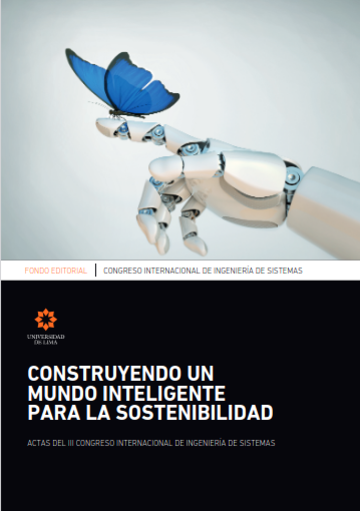Tecnología como impulsora del desarrollo sostenible: una mirada desde la investigación
DOI:
https://doi.org/10.26439/ciis2020.5512Palabras clave:
desarrollo sostenible, agenda global, desarrollo tecnológico, inteligencia artificial, investigación, academiaResumen
Tomando como punto de partida el contexto actual y reflexionando sobre la mane ra en que se debe construir la nueva normalidad de la que se hace mención actualmente, el presente artículo pone a consideración los principales hitos en los que debe basarse esta cons trucción, que debe ser de carácter transformador. En ese sentido, se identifica a la tecnología como una de las contribuciones más importantes para el impulso hacia el desarrollo soste nible, se establece preliminarmente la relación “desarrollo tecnológico-desarrollo sostenible”; esto último es producto de una revisión documentaria basada en la agenda 2030, en estudios académicos y científicos sobre tecnología, inteligencia artificial y su relación con los objetivos de desarrollo sostenible. Como resultado, se resalta el rol de la academia como motor de los avances científicos para el desarrollo tecnológico y la sostenibilidad. Finalmente, se presentan insumos potenciales de investigación en campos como tecnologías responsables, desarrollo sostenible basado en la tecnología, entre otros. Lo que se pone en evidencia es la necesidad de investigar la sostenibilidad como un sistema compuesto de tres dimensiones interdependien tes: una dimensión natural, una dimensión humana y una dimensión tecnológica.
Descargas
Referencias
Asociación 2030Vision. (2017). 2030 Vision Global Goals Technolog y Forum. Editorial SustainAbility.
CEPAL. (2019). La Agenda 2030 y los objetivos de desarrollo sostenible: una oportunidad para América Latina y el Caribe. Objetivos, metas e indicadores mundiales. https://repositorio.cepal.org/bitstream/handle/11362/40155/24/S1801141_es.pdf
Di Vaio, A., Palladino, R. Hassan, R., y Escobar, O. (2020). Artificial Intelligence and Business Models in the Sustainable Development Goals Perspective: A Systematic Literature Review. Journal of Business Research, 121, 283-314.
Duan, Y., Edwards J., y Kumar, Y. (2019). Artificial intelligence for Decision Making in the Era of Big Data Evolution, Challenges and Research Agenda. International Journal of Information Management, 48, 63-71. https://doi.org/10.1016/j.ijinfomgt.2019.01.021
González-Salamanca, J. C., Agudelo, O., y Salinas, J. (2020). Key Competences, Education for Sustainable Development and Strategies for the Development of 21st Century Skills. A Systematic Literature Review. Sustainability, 12(24). https://doi.org/10.3390/su122410366
Hoeschl, H. C., y Barcellos, V. (2006). Artificial Intelligence and Knowledge Management. IFIP International Conference on Artificial Intelligence in Theory and Practice (pp. 11-19). Springer. https://doi.org/10.1007/978-0-387-34747-9_2.
Johannessen, J., Olsen, B. y Olaisen, J. (1999). Aspects of Innovation Theory Based on Knowledge-Management. International Journal of Information Management, 19(2),121-139. https://doi.org/10.1016/S0268-4012(99)00004-3
Kaplan, A. M., y Haenlein, M. (2010). Users of the World, Unite! The Challenges and Opportunities of Social Media. Business Horizons, 53(1), 59-68.
Nilsson, M., Griggs D., y Visbeck, M. (2016). Policy: Map the Interactions Between Sustainable Development Goals. Nature, 534(7607), 320-322. https://doi.org/10.1038/534320a
Zhenmin, L. (2020). Informe de los objetivos sostenibles 2020. https://unstats.un.org/sdgs/report/2020/The-Sustainable-Development-Goals-Report-2020_Spanish.pdf






